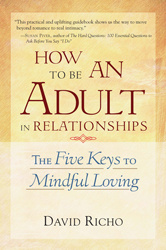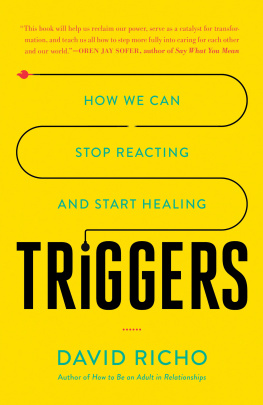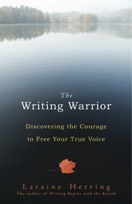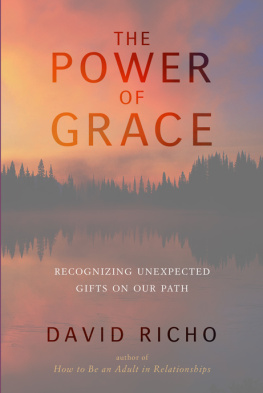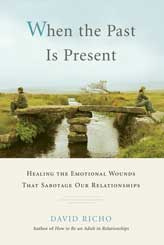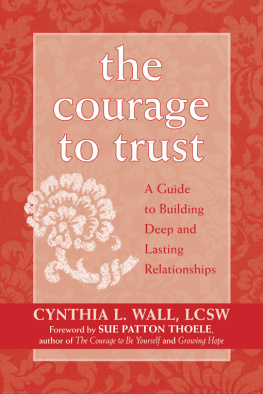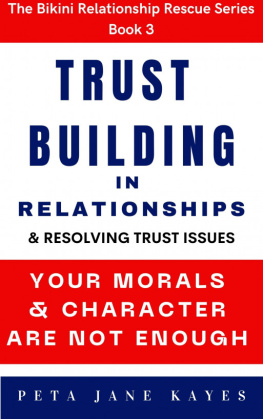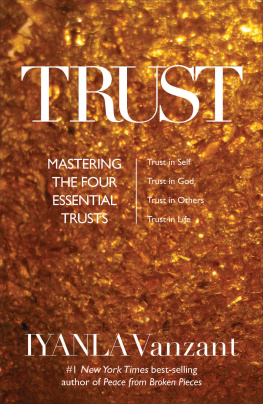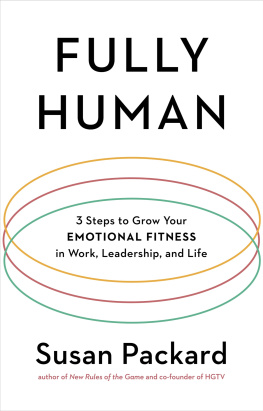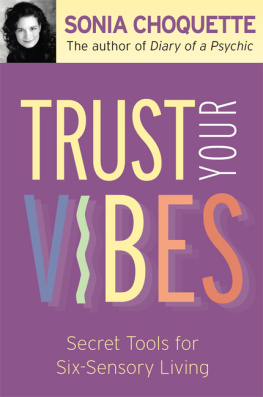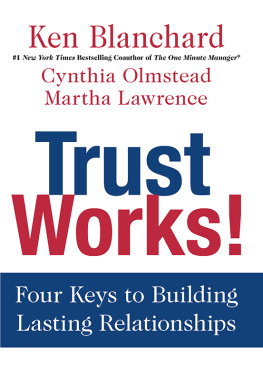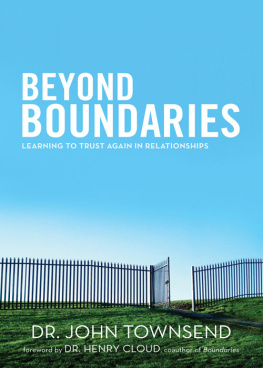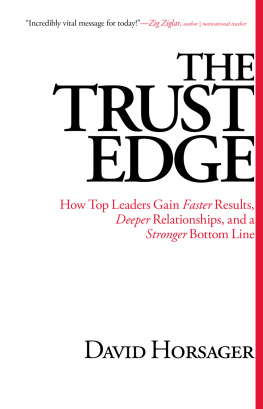Combining profound insights and practical techniques, this important new book walks us step-by-step through our trust issues and, in so doing, opens the gate held shut by our deepest fears so that we can finally, fearlessly, love and be loved.
Susan Piver, author of The Wisdom of a Broken Heart
Beautifully wise, straightforward, and helpful.
Jack Kornfield, author of The Wise Heart
Richo transforms his kindly advice into an easy-to-understand bible of trust.... Filled with informative quizzes and fact-based assessments, the slim book offers a great deal of real-world advice governing adult relations, especially regarding modern romance in a shifting world.
Publishers Weekly
[Richo] doesnt condescend to his readers, but rather tries to offer scenarios and appropriate responses that benefit everyone involved and get his readers trusting.
Portland Book Review
ABOUT THE BOOK
Most relationship problems are essentially trust issues, explains psychotherapist David Richo. Whether its fear of commitment, insecurity, jealousy, or a tendency to be controlling, the real obstacle is a fundamental lack of trustboth in ourselves and in our partner.
Daring to Trust offers key insights and practical exercises for exploring and addressing our trust issues in relationships. Topics include:
- How we learn early in life to trust others (or not to trust them)
- Why we fear trusting
- Developing greater trust in ourselves as the basis for trusting others
- How to know if someone is trustworthy
- Nave trust vs. healthy, adult trust
- What to do when trust is broken
Ultimately, Richo explains, we must develop trust in four directions: toward ourselves, toward others, toward life as it is, and toward a higher power or spiritual path. These four types of trust are not only the basis of healthy relationships, they are also the foundation of emotional well-being and freedom from fear
DAVID RICHO, PhD, is a psychotherapist, teacher, writer, and workshop leader whose work emphasizes the benefits of mindfulness and loving-kindness in personal growth and emotional well-being. He is the author of numerous books, including How to Be an Adult in Relationships and The Five Things We Cannot Change. He lives in Santa Barbara and San Francisco, California.
Sign up to learn more about our books and receive special offers from Shambhala Publications.

Or visit us online to sign up at shambhala.com/eshambhala.
Daring to Trust
Opening Ourselves to
Real Love and Intimacy
David Richo

SHAMBHALA
Boston & London
2010
Shambhala Publications, Inc.
Horticultural Hall
300 Massachusetts Avenue
Boston, Massachusetts 02115
www.shambhala.com
2010 by David Richo
All rights reserved. No part of this book may be reproduced in any form or by any means, electronic or mechanical, including photocopying, recording, or by any information storage and retrieval system, without permission in writing from the publisher.
Library of Congress Cataloging-in-Publication Data
Richo, David, 1940
Daring to trust: opening ourselves to real love and intimacy / David Richo.1st ed.
p. cm.
eISBN 978-0-8348-2207-8
ISBN 978-1-59030-824-0
1. Trust. 2. Love. 3. Intimacy (Psychology) I. Title.
BF575.T7R53 2010
158.2dc22
2010022881
In affectionate memory
of my caring mother,
Louise,
and
my path-lighting friend
Faye Honey Knopp
I will never forget you
What have we ever,
more or better,
than our life together?
We now embark on a voyage into waters more often troubled than tranquil. Only we bravehearts will want to board the ship called Trust. Can we trust the ship not to sink? Can we trust our shipmates? Those are the questions we keep pondering with respect to our families and relationships, not to mention our world.
Only those of us willing to be vulnerable can sail this Sea of Risk. If we fall overboard, headlong into the billows, we may fear their engulfing us. Can we trust our fragile bodies to stay afloat in such a rowdy sea? We tread water with no guarantee that the promised or hoped-for hand will be there for us in the chill and buffeting waves. And will the intrepid mate who dares to swim in our direction get us back on board and stay with us from ship to shore? There are fearsome hazards in the tides of human trust. But these are risks that most of us have been willing to take, again and again, greatly to our credit.
Sometimes our cruises pulled into ports where great loyalty awaited us. For that we were appreciative. Sometimes we have been severely betrayed by the one who seemed to be there for us but was not. For that we grieved. Our history of trust is the ships log of our life.
What follows in these pages is sometimes a life jacket, sometimes an anchor, sometimes little more than a plank stretching precariously over the lonesome blue uncharted deep. But we will find a way to surf the waves, not drown in them.
How This Book Came to Be
The origin of this book goes back to a memorable moment in a marriage-counseling session I was facilitating with a couple I will call Alice and Eric. Alice had had an affair, now over, and Eric had recently found out about it. Their purpose in therapy was to restore their relationshipthat is, to rebuild trust.
The therapy had been making it clear to all of us that it was extremely difficult for Eric to trust his wife again, even though she had voluntarily ended the other relationship and had made a sincere commitment to fidelity and to working things out. Enough time had elapsed so that it did seem reasonableto all three of usthat Eric could at least begin to trust Alice again. But that was not happening, even after some rather intense therapy sessions.
During a particularly poignant moment, Eric was crying and I suddenly realized that his issue was not about trusting Alice. It was bigger than that. It was about his inability to trust anyone fully. Erics grief in that moment was for all the betrayals in his life from childhood until now. His tears were about how each one had shut him down so that now, when trust was appropriate, he just could not summon it up. The fear that is natural in all grief had, for him, become more like a phobia. Erics question was not Is it safe to trust you? His real question was Is it safe to trust anyone?
That one session, a conference of tears, led me to realize more acutely than ever that trust is twofold. Trust can be a response to trustworthiness, but, prior to that, it has to be an ability, gained from experiences of secure relating in our past. Our trust capacity is proportional to the trustworthiness we have found in all our fellow travelers on lifes voyage, especially in Mom and Dad. Thus, we are not alone in building our flotation skills on lifes tempestuous sea. Trustworthy people in our lives from childhood to the present moment live on in our psyches as accompanying and stabilizing presences. They become part of our inner resources, the psychological and spiritual structures in ourselves that give us power to face threats and deal with our needs. Our memories of trustworthy people and our nostalgia for them are reminders and evocations of these resources. When the trustful bonds were being forged by and with them, our inner resources were being thereby installed. Now when we feel overwhelmed, we have a well of memories to draw strength from. Ralph Waldo Emerson spoke of this encouraging possibility in his address at Harvard Divinity School in 1838: We mark with light in the memory the few interviews we have had with souls that made our souls wiser, that spoke what we thought, that told us what we knew, that gave us leave to be what we inly are.
Next page
